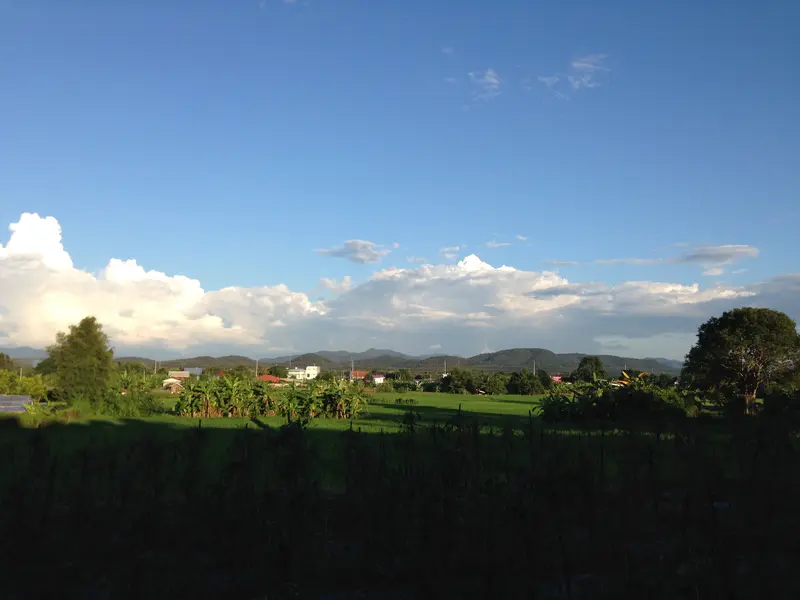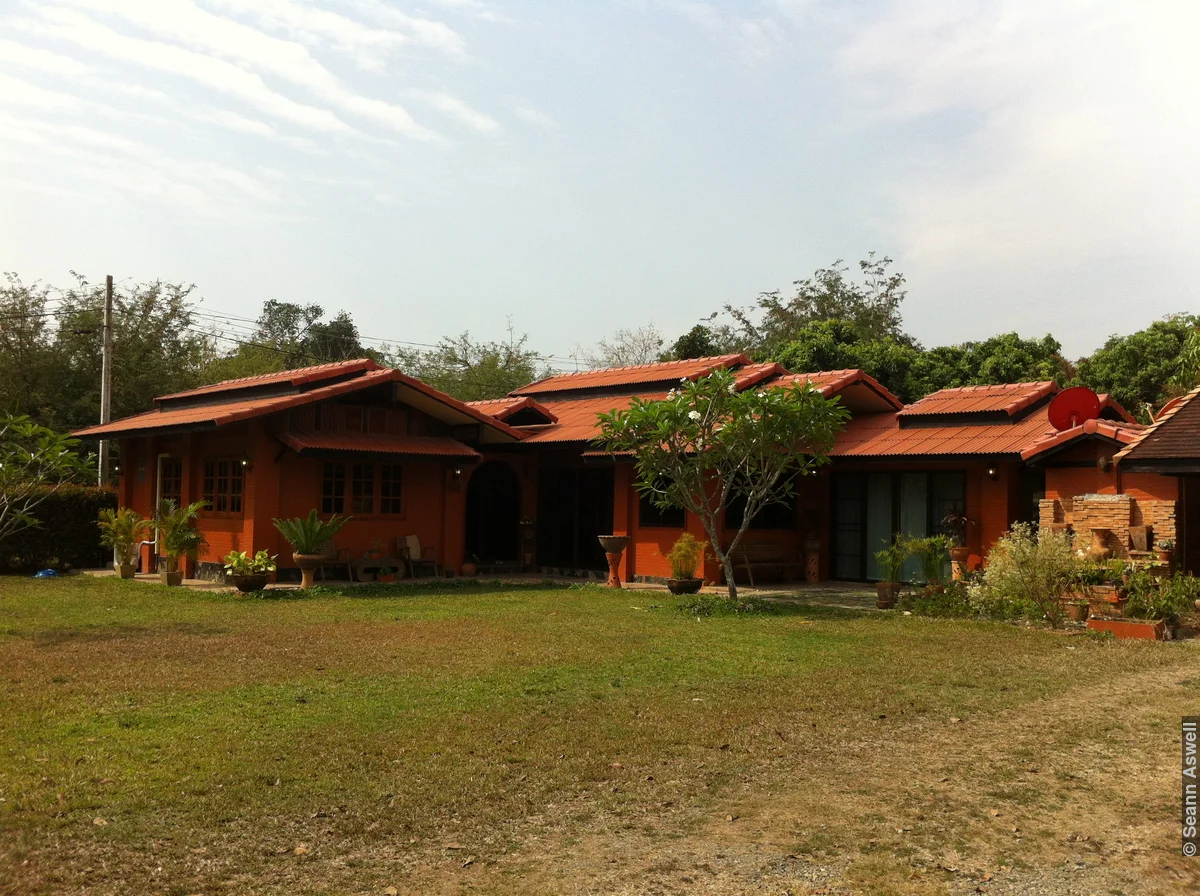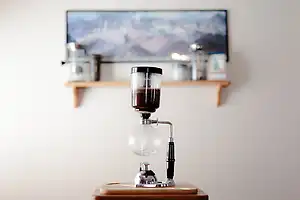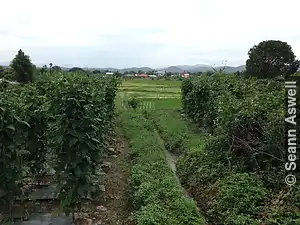Coffee with Monsanto
Living in Thailand was rarely boring. (See this article for details on our life in Thailand.)
Once I was able to speak enough Thai to feel comfortable living someplace with no tourists and few foreigners, we moved to a house in a Thai community outside of Mae Taeng.
Most of the homes were typical middle class Thai homes, belonging to local officials and business owners, but there was one property that stood out. It had high concrete walls, a tall gate with Shi-Shi statues on either side, and over the wall you could make out two barrel style metal roofs typical of either a contemporary commercial office building or a warehouse. The place was obviously new and well maintained, and I was curious what it might be, but we never bothered to ask our landlord.
One afternoon while out on our walk, the gate to the strange property was open. As we slowly walked past, peering inside to see what the gate was hiding, an Asian man walked out and in a very friendly tone waved and said "Hello". We were not used to hearing people speak English, so we stopped and chatted with the man as he was watering the landscaping just inside the gate.
After a few minutes he invited us in for coffee, and while we would normally decline such offers, something about the situation caused both of us to immediately accept. As we walked towards one of the identical buildings, past the rows of fruit trees, flowers and decorative plants of all kinds, we couldn't help but be impressed at how well maintained everything looked. We went inside and sat at the table in the main room while he went to the kitchen to get coffee. The space looked like a combination of contemporary office and minimalist apartment. The large LCD TV had been recessed into custom wood cabinetry, the surround speakers were very well hidden, and the lighting control switches on the wall hinted at an architect designed lighting system. This man was no ordinary Thai.
After a few minutes he brought out his coffee making aparatus and his manual hand-held coffee bean grinder, along with an electric water pot and some bottled water. He was a real coffee aficionado. For many years I had ground my own beans and used a french press, but after learning about siphon brewing and trying a cup of his brew, it was obvious there was much more to learn about making good coffee.
His father was a Chinese businessman from Hong Kong, and his mother was Thai. He lived in Bangkok, but when doing business in the north he stayed at this place. His business, as it turned out, was selling agricultural supplies to hardware stores and commercial farms. He was a Monsanto representative.
To say I am not a fan of Monsanto is an understatement. Since the early 1990's I had been aware of the health impacts of things like chemical fertilizers, pesticides and GMO's, and avoided all of it whenever possible. During our travels thru rural Thailand we had seen farmers walking thru the fields spraying their crops with chemicals, had seen the signs advertising various kinds of GMO corn seeds, and noticed the large sections at local hardware stores dedicated to fertilizers and pesticides of all kinds, all of which made me very sad. And, here we were, sitting in the office of a man who played a part in what we had seen.
After many years working for people who were, at times, involved in things that I philosophically disagreed with, it had become easier to see people as people, apart from what they did for a living or what they represented. However, not speaking up was very challenging for me. Eventually, as respectfully as possible I questioned the effectiveness of using chemicals versus growing organically. He brought out a binder containing the results of some long term studies that were done at Chiang Mai University showing how well something grew, I don't recall what exactly, compared to the same plant that was not treated. There were lots of charts and statistics and seemingly convincing data, and I realized that he genuinely believed that what he was selling was good, he believed the marketing material he was given.
As the conversation continued, he mentioned the impact that the drought Thailand was experiencing at the time had on rice farmers. It also affected his business, but he was more concerned about the stories he had heard from local store owners and the farmers themselves. Many were going into debt buying fertilizer and various chemicals typically used in rice cultivation, and bad harvests due to water shortages meant they were unable to pay back the loans. It wasn't just one bad year either, there had been several, and he was genuinely concerned for the future of Thai farmers. At that point, it was clear he was not the selfish, short sighted profiteer that I had imagined anyone involved in promoting Monsanto products must be.
After several rounds of coffee, a dark skinned Thai man came in from the building next door, and seemed surprised to see strangers at his bosses desk having coffee. He had the appearance of a farmer who had just come in from a days work, and what looked like chemical burns on one side of his face. Our host said something in an authoritative tone, and walked with him outside. After he came back and apologized for the interuption, I asked if he knew anything about hemp cultivation.
Hemp doesn't require much water, nor fertilizer or pesticides to grow. I wasn't sure how Thailand regulated hemp farming at that time (2016), but suggested it might be a good crop for farmers that were not able to cultivate rice due to water shortages. And, I had recently read that some countries like Canada were looking for sources of hemp to import for making various products, and suggested there could be an international market even if there wasn't much of a domestic one.
He seemed interested, and as we were leaving we exchanged contact info and I promised to follow-up with more info. The next day I spent the afternoon doing a little research, collecting links to information regarding hemp cultivation and potential markets where the crop could be used, and sent him an email. We left Thailand about a month later, and didn't hear anything more from him.
A few years later, after hearing that Thailand intended to ban glyphosate, I remembered that afternoon, and hoped he took the time to explore new business opportunities. Now that Thailand has legalized cannabis, Thai farmers have a cash crop that isn't so water and chemical intensive, and is at least potentially more profitable that the alternatives.
That experience was a good reminder of why it's good to not write people off based on what they believe or who they work for. If we do, we might miss out on opportunities to enjoy good coffee, and learn some valuable lessons.




